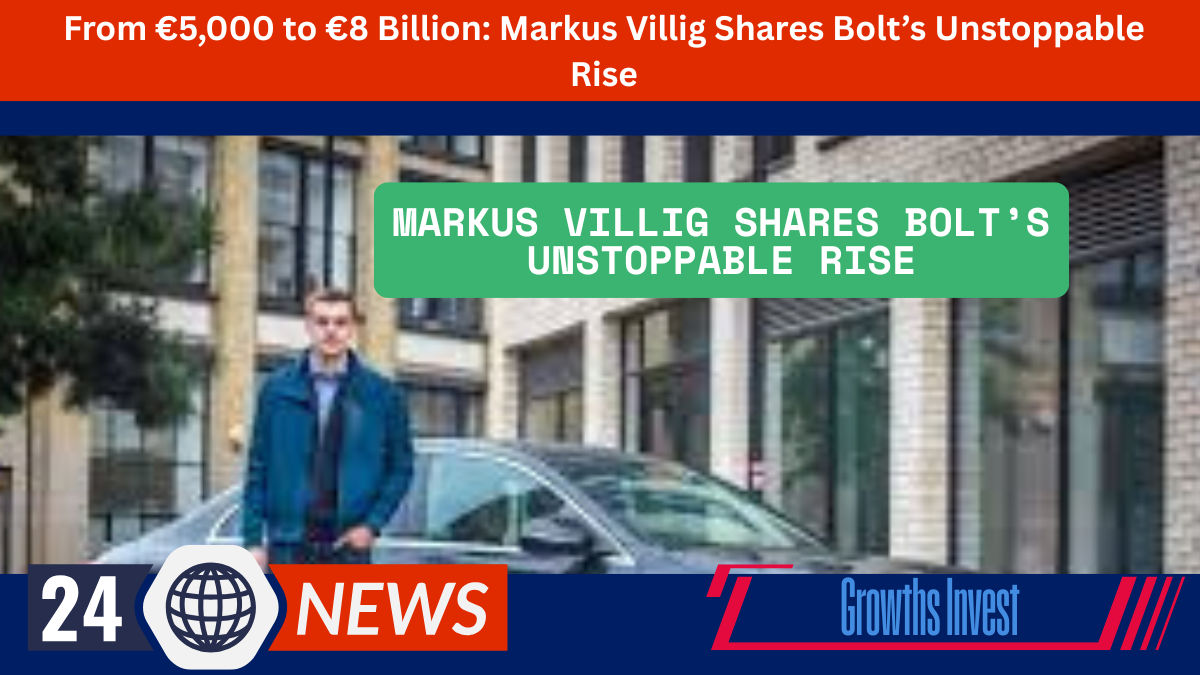Chess player. Workaholic. Tech visionary. And one of Europe’s youngest self-made billionaires. At just 31, Markus Villig, the founder and CEO of Bolt, has transformed a modest loan from his parents into a European mobility giant. In this exclusive conversation with Capital, the Estonian entrepreneur opens up about Bolt’s meteoric rise, his vision for driverless cities, his thoughts on Elon Musk, and how he’s supporting his country in the face of Russian threats.
Sitting at the helm of a €2 billion mobility empire, Markus Villig is redefining how Europeans move—whether it’s through ride-hailing, e-scooters, e-bikes, grocery delivery, or car rentals. Despite his youth, Villig’s entrepreneurial journey started over a decade ago in Estonia, just as Uber was making its debut with black car services in the United States.
Twelve years on, Bolt has carved out a massive footprint across 50 countries. Now, Villig is betting big on France—and on a future driven by autonomous vehicles.
“France is Our Largest Market—and It’s Just the Beginning”
CAPITAL: You don’t often come to France, yet it seems like the country is central to Bolt’s strategy?
Markus Villig: Absolutely. Out of the 50 countries we operate in, France is by far our biggest market. We already serve millions of customers here, and we’re just getting started. Our Paris office houses 60 employees, and we’ve built strong teams in major cities like Marseille, Nice, Bordeaux, Lyon, and Lille. France is a key focus for our growth.
How a Teen’s Curiosity Sparked a Tech Revolution
CAPITAL: Let’s go back to the beginning. How did the idea for Bolt come about?
M.V.: I’ve always had a passion for tech. As a teenager, I was building websites for fun. At 19, during my final year of high school, all my classmates were stressing over their exams—I wasn’t particularly interested. I literally Googled: “How to start a company?” That’s how it all began.
My parents lent me €5,000 to get started. That was my seed capital. No investors, no safety net—just a lot of ambition. At the time, Uber was focused on luxury cars. I saw a gap for affordable, everyday transportation in smaller cities. That’s where Bolt found its niche.
Building a Tech Giant—One Market at a Time
What sets Bolt apart from competitors like Uber or Lyft? For Villig, it’s about staying lean, focused, and committed to sustainable, user-friendly mobility.
“From the start, we were obsessed with efficiency,” he explains. “We’ve always kept our costs lower and offered better rates to both drivers and passengers. That’s how we’ve built trust.”
While Uber may dominate the headlines, Bolt is steadily gaining ground in Europe and Africa. The company now operates in over 500 cities and continues to diversify, with services ranging from electric scooters to grocery delivery.
Betting on the Driverless Future
Villig is a firm believer that the future of urban mobility lies in automation—and that it’s arriving sooner than most expect.
“I’m convinced self-driving cars will become a part of everyday life in our cities much sooner than people think,” he says. “We’re already working on integrating autonomous vehicle technology into our platform. It won’t happen overnight, but we’re preparing for that transition.”
He sees this evolution as not just a technical breakthrough, but a societal one. “Imagine the impact—safer roads, less congestion, and more equitable access to transportation.”
On Elon Musk: Admiration with Reservations
It’s impossible to talk about future mobility without mentioning Elon Musk. So what does Villig think of the Tesla and SpaceX mogul?
“Elon Musk is clearly a brilliant innovator,” he says. “He’s done incredible things with electric vehicles and space technology. But I think sometimes he underestimates the complexity of building sustainable, user-first urban systems. Technology is one piece of the puzzle—the other is policy, public infrastructure, and affordability.”
Supporting Estonia Amid Geopolitical Tension
As Russia’s aggression continues to loom over the Baltic region, Villig remains deeply connected to his homeland. He’s used his platform to support Estonia both economically and diplomatically.
“I’m proud to be Estonian. Our country has shown incredible resilience,” he says. “Bolt is one of the biggest tech employers in Estonia, and we’re doing everything we can to create jobs, foster innovation, and support our national defense efforts when needed.”
Villig has also invested in cybersecurity and infrastructure projects that bolster Estonia’s digital defenses—a priority for a nation constantly on alert.
What’s Next for Bolt?
Despite already reaching unicorn status, Villig is far from finished. He sees Bolt evolving into a multi-modal mobility platform that can replace personal car ownership entirely.
“Our goal is simple,” he says. “We want to make owning a private car obsolete in cities. Why should someone pay to maintain a car, park it, and fuel it when they can access everything—rides, scooters, groceries—on demand, through one app?”
With expansion plans, new services, and autonomous vehicles on the horizon, Bolt is racing toward a future where mobility is smarter, cleaner, and more accessible.
From a €5,000 loan to an €8 billion valuation, Markus Villig’s story is a testament to what bold thinking and relentless execution can achieve. And while he may not court the spotlight like some of his Silicon Valley counterparts, his quiet determination is shaping the way millions of people move—across France, across Europe, and beyond.
As Villig sees it: “This isn’t just about building a company. It’s about rethinking the future of our cities.”

